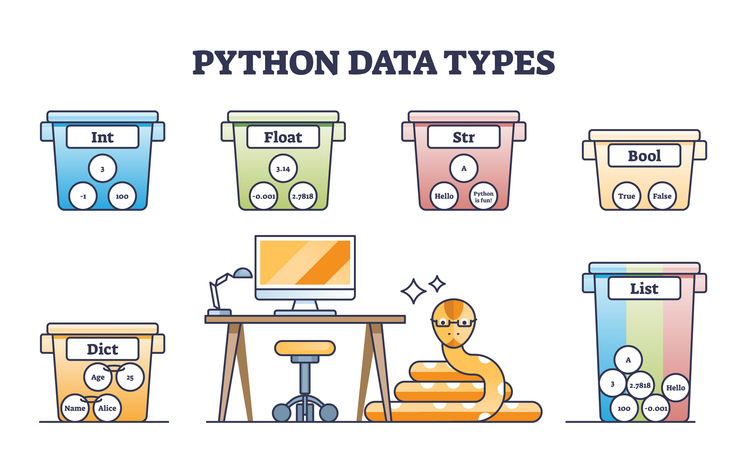5 min read
Mastering Python Iterable Data Types: Lists, Sets, Tuples, and Dictionaries
Picture yourself embarking on a grand adventure, not through treacherous landscapes or ancient ruins, but through the realms of Python programming,...
2 min read
![]() The Amazing Team at Skills Data Analytics
:
Apr 19, 2024 11:22:17 AM
The Amazing Team at Skills Data Analytics
:
Apr 19, 2024 11:22:17 AM
Embarking on the Python programming journey is like discovering a new galaxy. It's vast, exciting, and filled with endless possibilities. For those of us who've dipped our toes into this universe, the concepts of Object-Oriented Programming (OOP) - inheritance, polymorphism, and abstraction - are the stars that guide us. They're not just jargon; they're the tools that empower us to write code that's not only effective but elegant. Let's explore these concepts together, weaving in practical tips, real-life applications, and a dash of personal experience to keep our journey grounded and engaging.
Remember the first time you learned about inheritance? It was like finding a cheat code in a video game. Suddenly, you could create new classes that inherited attributes and methods from existing ones, eliminating redundant code. It's like how in families, children inherit traits from their parents. In programming, this not only makes your code cleaner but also easier to manage.
Practical Tip: Start simple. Create a base class with general attributes and methods, then derive more specific classes from it. This will help you grasp the concept of inheritance more concretely.
Polymorphism might sound like a term from a fantasy novel, but it's actually a feature that allows for flexibility and creativity in programming. It's the reason you can use a single interface for different data types or classes. Think of it as being multilingual: the same word can have different meanings in different languages, just like how the same function can perform differently based on the object it's acting upon.
Real-Life Application: Look at how prominent organizations handle multiple payment methods in their applications. They use polymorphism to process different payment types (credit card, PayPal, etc.) through a single payment interface, making their code more efficient and scalable.
Abstraction is all about hiding the complexity and showing only the essential features of an object or system. It's like a car - you don't need to know how the engine works to drive it; you just need to know how to use the steering wheel, pedals, and gears. In programming, abstraction helps in reducing complexity and increasing efficiency.
Personal Experience: When I first tackled a complex project, abstraction was my saving grace. By focusing on the 'what' rather than the 'how,' I was able to simplify my approach and tackle the problem more effectively.
While inheritance, polymorphism, and abstraction are crucial, mastering Python OOP doesn't stop there. Understanding object deletion, property removal, and memory management is essential for writing efficient, error-free code.
Mastering Python's OOP features - inheritance, polymorphism, abstraction, and beyond - is akin to acquiring a superpower. It transforms the way you approach programming, from a task to an art form. Here are the key takeaways:
As you continue your Python journey, remember that these concepts are tools at your disposal, ready to help you solve problems and create amazing programs. Happy coding!
For further exploration of data analysis and analytics, check out our bootcamp program on Data Analytics.
FAQs
What is inheritance in Python?
It allows new classes to inherit features from existing classes.Can you explain polymorphism with an example?
Polymorphism lets us use the same function name for different types. For example, the "+" operator can add numbers and concatenate strings.Why is abstraction important in programming?
It helps hide complex details, showing only what's necessary for the user to interact with.What happens when an object is deleted in Python?
The object is removed from memory, freeing up resources.How does Python manage memory for objects?
Python's garbage collector automatically handles memory allocation and deallocation for objects.
5 min read
Picture yourself embarking on a grand adventure, not through treacherous landscapes or ancient ruins, but through the realms of Python programming,...

3 min read
There's a certain thrill in discovering tools that make your work not just easier, but more enjoyable. Jupyter Notebook is one such tool,...

4 min read
Embarking on the journey of learning programming is like setting sail into a vast ocean of opportunities. Among the numerous languages charting the...